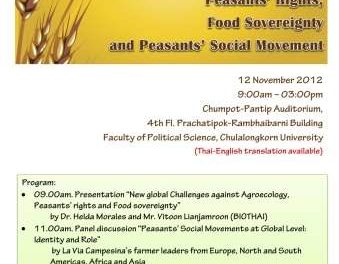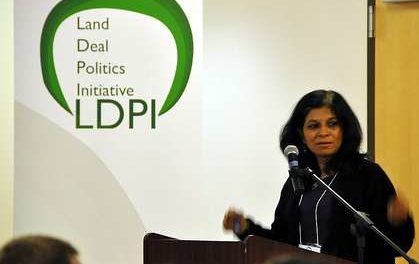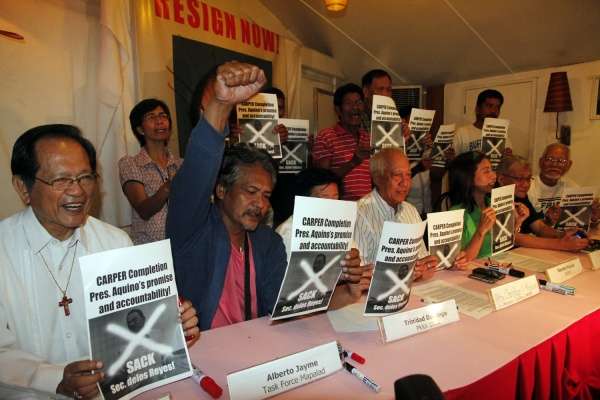On Monday March 12, the water justice movement met with United Nations special rapporteur Catarina de Alburquerque, as well as eight national governments and the deputy mayor of Paris, outside the corporate World Water Forum in Marseille, France to highlight the need to implement the right to water and sanitation worldwide. Blue Planet Project staff present for today’s interventions in Marseille included water campaigner Meera Karunananthan, Mexico City-based organizer Claudia Campero Arena, New Delhi-based organizer Madhuresh Kumar, Durban-based Mary Galvin, and political director Brent Patterson.
Governments invited to step outside of the World Water Forum
In the morning, Karunanthan and Patterson made our way into the World Water Forum using Canadian Perspectives media credentials. We used our time there to identify those with ‘country delegate’ passes and to invite them to our civil society-government meeting down the street from the conference area. We were able to approach representatives of Switzerland, Germany, Poland, Togo, Palestine and Angola to tell them about this meeting and to talk with them about our issues of concern. We are asking governments to reject the World Water Forum, commit to the implementation of the right to water and sanitation, and to support our call for a UN conference focused on the implementation of these rights.
Consultation with UN special rapporteur Catarina de Alburquerque
About 50 civil society members were present in the afternoon to meet with UN special rapporteur on the right to water and sanitation Catarina de Alburquerque.
A highlight of the meeting was the presentation to de Alburquerque by Karunananthan of ten reports commissioned by the Blue Planet Project to support local campaigns for water justice. These reports provide insight and analysis into how our allies around the world are promoting the human right to water and sanitation in their countries against a backdrop of land grabs, mining injustice, economic austerity, and environmental racism. The country reports presented to the UN special rapporteur were from Argentina, Colombia, Ecuador (in Spanish) and Europe, India, Indonesia, Palestine, the United States and Canada (in English).
Earlier in the day the Palestine report – in which the Palestinian collective Life Source explores violations of the human right to water by Israel and the Palestinian authority in West Bank and Gaza, and demonstrates the importance of global solidarity in achieving the human right to water for Palestinians – was presented by Karunananthan to a Palestinian delegate at the World Water Forum.
Government-civil society meeting
Later that afternoon, eight governments – the United States, Germany, Spain, Nigeria, Uruguay, Panama, Colombia and Bolivia – met with 60-75 civil society activists at a meeting organized by numerous groups. Mexico City-based Blue Planet Project organizer Claudia Campero Arena moderated the session that included Wenonah Hauter of Food & Water Watch/ United States, David Boys of Public Services International/ United Kingdom, Cristian Villarroel of Chile Sustentable, Mary Ann Manahan of Focus on the Global South/ the Philippines, Elyzabeth Peredo of La Fundacion Solon/ Bolivia, and Babalobi Babatope of WASH-JN/ Nigeria.
The speakers presented on the problematic nature of the World Water Forum, the negative experiences with water privatization, challenges related to the implementation of the right to water and sanitation, how the green economy would undermine these rights, and much more.
A six-page civil society ‘call to action’ – available in English, French and Spanish – with our analysis and demands was made available to those at the meeting. More than 75 organizations from around the world have signed this statement which says, “We are social justice organizations, indigenous peoples, trade unions, environmental groups, farmers, writers, academics, human rights advocates, community activists and networks which share a vision of water as a fundamental human right and a commons, not a commodity.”
Everyone in attendance also received a multi-lingual book mark that highlighted thehttp://blueplanetproject.net website where the ten country reports on the human right to water and sanitation can be read or downloaded free of charge.
Initial media coverage
Karunananthan was interviewed by Claire Provost of the Guardian UK, who was particularly interested in Canada’s role in blocking right to water language in the Ministerial Declaration, the country reports, the civil society call to action, and plans Maude Barlow and the Council of Canadians had for the remainder of the week to challenge the World Water Forum.
In Provost’s first report published earlier in the day, she wrote, “Critics say the forum, which costs as much as 700 euros for full access, caters to the interests of big business and gives corporations opportunities to advance their interests by facilitating direct access to high-ranking government officials. Starting on Wednesday, activists are staging an Alternative World Water Forum to promote alternatives to privatisation and share experiences on how to promote public and community-led water management from the bottom-up.”
Also earlier in the day, IPS reported (in Spanish), “The Mesoamerica region, comprising the southern states of Mexico and seven Central American countries, is generally rich in fresh water, but very vulnerable to changes in the medium to long term, which may reduce their availability. …A scenario of the waste, pollution and lack of governance with respect to water will be reported by non-governmental organizations to the Sixth World Water Forum being held in the southern French city of Marseille. In Mexico there is a ‘mismanagement manifested in pollution and the unequal distribution between uses, urban and rural areas and between cities,’ described the coordinator for Latin America of Canadian Blue Planet Project, Claudia Campero, which seeks to protect the world’s freshwater.”
That article noted, “Nearly 500,000 users of agricultural irrigation consumes 32 million cubic meters annually, according to the National Water Commission of Mexico. But 30 percent of households have no piped water and another 15 percent receive it every three days by other means, in this country of over 107 million people, according to data from the National Institute of Statistics and Geography. Access to safe water is a basic human right, recognized by the United Nations Organization in 2010, which also made it binding. State parties are obliged to adopt this principle by giving constitutional status and incorporating it into their national legislation. Mexico should amend the National Water Act, to conform to the constitutional change. Guatemala and El Salvador do not even have that kind of legal frameworks.”

![The definition of crime and democracy in the Northeast [India]](https://focusweb.org/wp-content/themes/Extra/images/post-format-thumb-text.svg)







